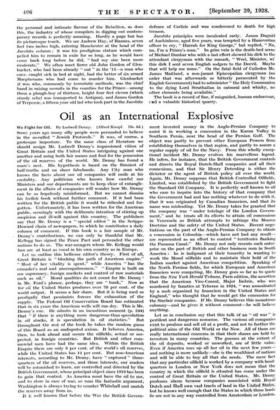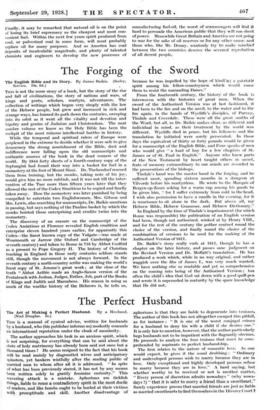Oil as an International Explosive
We Fight for Oil. By Ludwell Denny. (Alfred Knopf. 18s. 6d.) Sow: years ago many silly people were persuaded to believe in the so-called " Jewish Protocols." It was, of course, a grotesque imposture. To the same class of literature we should assign Mr. Ludwell Denny's impassioned vision of Great Britain and the United States intriguing against one another and using both fair means and foul for the possession of- the oil reserves of the world. Mr. Denny has found a mare's nest. His hypothesis is based on the flimsiest of half-truths and on sheer falsehoods. Any City man who knows the facts about our oil companies will smile at his credulity. Any politician who knows how careful our Ministers and our departments are to keep clear of entangle- ment in the affairs of companies will wonder how Mr. Denny can be so hopelessly misinformed. But we cannot dismiss his foolish book without further comment. If it had been written for the British public it would be ridiculed and for- gotten. Unfortunately, it has been written for the American public, seemingly with the deliberate intention of stirring up suspicion and ill-will against this country. The publishers say that Mr. Denny is a " special editor " in the Scripps- Howard chain of newspapers, to which he contributes a daily column of comment. If this book is a fair sample of Mr. Denny's contributions, we can only be thankful that Mr. Kellogg has signed the Peace Pact and persuaded the other nations to do so. The war-mongers whom Mr. Kellogg would ban are at least as vocal in his own country as in Europe.
Let us outline this bellicose editor's theory. First of all, Great Britain is " blocking the path of American empire." " Most of her vitality is spent," while America " has the crusader's zeal and unscrupulousness." " Empire is built on sea supremacy, foreign markets and control of raw materials such as oil." Moral qualities do not count for Mr. Denny : in Mr. Ford's phrase, perhaps, they are " bunk," Now as for oil the United States produces over 70 per cent. of the world output. It seems a fair share. But it is being used so prodigally that pessimists foresee the exhaustion of the supply. The Federal Oil Conservation Board has estimated that in six years the American wells will run dry. This is Mr. Denny's cue. He admits in an incautious moment (p. 244) that " if there is anything more dangerous than speculation in oil stocks, it is speculation in oil statistics." But throughout the rest of the book he takes the random guess of this BOard as an undisputed axiom. It behoves America, then, to look ahead and secure the oilfields, actual or sus- pected, in foreign countries. But British and other com- mercial men have had the same idea. Within the British Empire there are only 6 per cent. of the world's oil reserves, while the United States has 12 per cent. But non-American interests, according to Mr. Denny, have " captured " three- - quarters of the oil reserves, and those interests, our readers will be astonished to learn, are controlled and directed by the British Government, whose principal object since 1919 has been to gain that control. As America must have the oil to use, and to. store in case of war, so runs the fantastic argument, Washington is always trying to coon:tel. Whitehall and snatch the reserves away from us.
It is well known that before the War the British Govern-
merit invested money in the Anglo-Persian Company to assist it in working a concession in the Karun Valley in Southern Persia, near the head of the Persian Gulf. The object was partly to prevent other European Powers from establishing themselves in that region, and partly to assure a regular supply of oil for the Navy. From this wholly excep- tional incident Mr. Denny evolves his marvellous legend. He infers, for instance, that the British Government controls and directs the Royal Dutch-Shell companies and all their connexions, and that Sir Henry Deterding is either the dictator or the agent of British policy all over the world, Again, Mr. Denny supposes that British Controlled Oilfields, Limited, was established by the British Government to fight the Standard Oil Company. It is perfectly well known to all who care to inquire into the history of that company that the Government had and has nothing whatever to do with it, that it was originated by Canadian financiers, and that its name was misleading. Yet Mr. Denny takes for granted that the company was " under tutelage of the London Govern- ment," and he treats all its efforts to attain oil concessions in Venezuela as British attempts to infringe the Monroe Doctrine and the safety of the United States. Recent nego- tiations on the part of the Anglo-Persian Company to obtain a concession in Colombia—which have not had any result— are represented as an effort to control " territories flanking the Panama Canal." Mr. Denny not only resents such enter- prise on the part of British and other business men in South America : he is indignant at their temerity in wanting to work the Mosul oilfields and to maintain their hold of the Indian market against American competition. Speaking of the North Persian fields, for which European and American financiers were competing, Mr. Denny goes so far as to quote from the New York Herald Tribune, Paris edition, the assertion that the American Vice-Consul, Major Imbrie, who was murdered by fanatics at Teheran in 1924, " was assassinated by a mob organized by financiers in the United States and England," who thought that he would get the concession for the Sinclair companies. If Mr. Denny believes this monstrous calumny—and he gives it without comment—he will believe anything
Let us in conclusion say that this talk of an " oil war " is pestilent and dangerous nonsense. The various oil companies exist to produce and sell oil at a profit, and not to further the political aims of the Old World or the New. All of them are really international concerns in that their shares are held by investors in many countries. The guesses at the extent of the oil deposits, worked or unworked, are of little value. Even if America uses up all her oil in the next few years— and nothing is more unlikely—she is the wealthiest of nations and will be able to buy all that she needs. The mere fact that any particular oilfield is worked by a company with head- quarters in London or New York does not mean that the country in which the oilfield is situated has come under the control of Great Britain or the United States. Mr. Denny professes alarm because companies associated with Royal Dutch and Shell own vast tracts of land in the United States, but he knows well enough that the States in which those lands lie are not in any way controlled from Amsterdam or London.
Finally, it may be remarked that natural oil is on the point of losing its brief supremacy as the cheapest and most con- venient fuel. Within the next few years spirit produced from coal, or pulverized coal in some form, will most probably replace oil for many purposes. And as America has coal deposits of incalculable magnitude, and plenty of talented chemists and engineers to develop the new processes of
manufacturing fuel-oil, the worst of scaremongers will find it hard to persuade the American public that they will run short of power. Meanwhile Great Britain and America are not going to war for the sake of oil reserves or for any other cause, and those who, like Mr. Denny, wantonly try to make mischief between the two countries deserve the severest reprobation of all decent people.





































 Previous page
Previous page